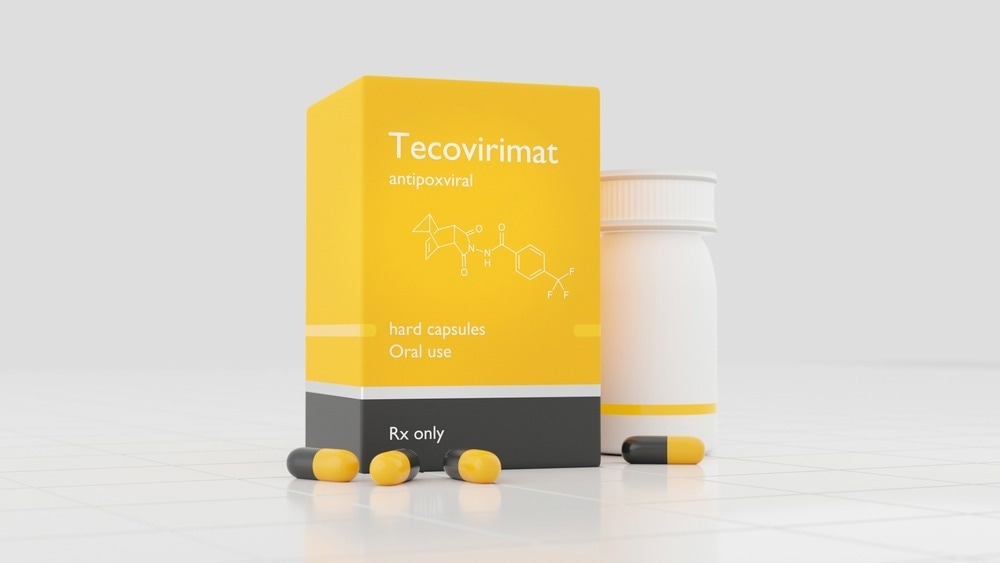Preliminary study shows tecovirimat was well tolerated by patients with monkeypox

In a recent study published in JAMA, researchers investigated the usage of tecovirimat against monkeypox infections.

Background
A zoonotic orthopoxvirus belonging to the same genus as variola is monkeypox which also causes smallpox. As of August 18, 2022, there have been over 39,000 cases reported as a result of a recent global outbreak. In previous outbreaks, symptoms of monkeypox typically lasted between two and four weeks.
In a recent study, 13% of patients needed to be hospitalized, indicating the need for efficient therapy. The antiviral tecovirimat prevents the release of enveloped viruses, viral pathogenicity, and viral spread by inhibiting the activity of the protein p37 and has displayed a positive clinical safety profile.
About the study
In the present study, researchers evaluated adverse events and clinical remission of systemic symptoms and lesions in a non-controlled cohort study of patients infected with monkeypox who received tecovirimat as compassionate use therapy.
Following polymerase chain reaction test confirmation of orthopoxvirus infection from skin lesions, patients were eligible for tecovirimat treatment. Treatment was made available to outpatients with lesions that had spread to delicate places like the face or vaginal area. For enhanced absorption, oral tecovirimat therapy for adult patients was based on weight, given every eight or 12 hours, and eaten within 30 minutes of a meal with moderate to high-fat content.
The 14-day therapy period could be prolonged based on the patient's clinical condition. Clinical information was gathered during the initial in-person assessment for treatment as well as on days 7 and 21 after the start of therapy through in-person or telephone interviews.
Results
A total of 25 monkeypox-infected individuals had completed their course of tecovirimat therapy as of August 13, 2022. The median age of the patients, who were all self-identified men, was 40.7 years. One patient reported receiving the smallpox vaccine over 25 years ago, four patients received one dose of the JYNNEOS vaccine following the onset of symptoms, and nine reported HIV.
Systemic signs, lesions, or both were present observed at the time of treatment for an average of 12 days. 76% of patients had a fever, 32% had headaches, 28% had fatigue, 20% experienced chills, 12% had backaches, 8% had myalgia, 4% had nausea, and 4% had diarrhea. Furthermore, 92% of the individuals had genital and/or perianal issues, and 15% had fewer than ten lesions across their bodies.
While the other patients only had 14 days of treatment, one patient underwent 21 days of therapy. On day 7 of therapy, complete remission of lesions was observed in 40% of the patients, while by day 21, complete resolution of lesions and discomfort was documented in 92% of the patients. No patient discontinued therapy while receiving tecovirimat treatment, which was typically well tolerated. On day seven of therapy, the following side effects were most commonly reported: fatigue in 28% of patients, headache in 20%, nausea in 16%, itching in 8%, and diarrhea in 8% of patients.
Overall, the study findings showed that all individuals with monkeypox infection tolerated oral tecovirimat with few side effects. Patients' timelines for symptom development and presentation varied. Thus, it is important to proceed cautiously when concluding the use of antivirals vs. the natural course of the infection.
- Desai, A. et al. (2022) "Compassionate Use of Tecovirimat for the Treatment of Monkeypox Infection", JAMA. doi: 10.1001/jama.2022.15336. https://jamanetwork.com/journals/jama/fullarticle/2795743?guestAccessKey=300cc546-00c4-47df-99d6-0a606da1e210
Posted in: Medical Science News | Medical Research News | Disease/Infection News
Tags: Diarrhea, Fatigue, Fever, Headache, HIV, Monkeypox, Nausea, Polymerase, Polymerase Chain Reaction, Protein, Skin, Smallpox, Vaccine, Vaginal

Written by
Bhavana Kunkalikar
Bhavana Kunkalikar is a medical writer based in Goa, India. Her academic background is in Pharmaceutical sciences and she holds a Bachelor's degree in Pharmacy. Her educational background allowed her to foster an interest in anatomical and physiological sciences. Her college project work based on ‘The manifestations and causes of sickle cell anemia’ formed the stepping stone to a life-long fascination with human pathophysiology.
Source: Read Full Article